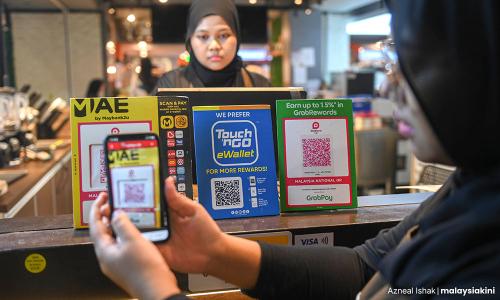LETTER | Cashless transactions – are we going too far too fast?
LETTER | In Budget 2024, the government announced a framework to encourage cashless transactions among the rakyat and such transactions have been growing rapidly.
Bank Negara recorded a total of RM11.5 billion in cashless payment transactions in 2023. The deputy digital minister further indicated that cashless transactions increased from RM7.2 billion in 2021 to RM9.5 billion in 2022.
Have cashless transactions grown too fast? What are the consequences of this rapid growth on society, especially for the vulnerable members?
It cannot be denied that cashless transaction brings many benefits including efficiency and speed, cost-effectiveness, enhanced security, global accessibility, financial inclusion and data insights and analytics.
Yet what is the impact on the vulnerable including the elderly?
The recent scam by fake Samaritans in Johor Bahru is one example of the impact of digital finance on seniors.
Many senior citizens lack the confidence and skills to use the ATM machine for withdrawals and transfers. Thus when they fumble or struggle at the ATM machine, the fake volunteers would help to undertake their transactions.
Trusting these “volunteers”, the seniors hand over their card and pin number, resulting in the fraudsters withdrawing the cash from seniors’ accounts and disappearing.
This could have been avoided if the banks concerned identified and sought to assist senior citizens or other vulnerable groups. Or better still, allow counter service to them for cash deposits, withdrawals or other transactions.
What seniors and other vulnerable groups are asking for is the return of their banking passbooks, and access to counter service.
Or else at the very least assistance and support from bank staff to enable them to navigate the frequently complex process of ATM use and other digital transactions.
Slow down to catch up
Unfortunately, many so-called progressive policymakers consider moves to help seniors as backward. They argue that we must move forward instead.
For them, the way forward is the digitalisation of finances and cashless transactions. If seniors or other vulnerable groups suffer because of their callous and insensitive attitudes, it is their problem. They insist we must move forward with digitalisation.
Further, at the retail level, some outlets refuse cash and payments can only be made through cashless transactions. If vulnerable groups do not know how to pay through cashless transactions and ask to pay in cash, they are refused service.
It is noteworthy that even in China, which is the paragon for cashless transactions, efforts are moving to broadly crack down on the rejection of cash payments.
In May 2024, China’s Central Bank fined seven businesses, including a KFC franchise for rejecting cash payments.
The businesses were fined between RM1,900 and RM35,000. These fines were part of the Chinese authorities’ efforts to ensure that physical currency remains accepted in the country.
The authorities expressed concern about the implications of a cash-free economy on the elderly Chinese who are less digitally proficient than the general population.
It is illegal in China to reject cash payments, no matter what the preferences of the merchants are.
The number of outlets in Malaysia with “we are a cashless outlet - we only accept cards and e-wallet payments” is growing. Can we show the same concern for Malaysian seniors?
Sweden, one of the advanced countries using cashless transactions, is questioning if it has indeed gone too far and too fast.
The rapid digitalisation in finance has also resulted in the rapid growth of scams and financial frauds. The Central Bank has admitted that one of the key causes has been advanced digitalisation.
For example, it reported that welfare payment fraud increased from 9,000 cases in 2014 to 23,000 in 2023.
The Swedish Bankers Association has suggested that it is a challenge to find the right balance between accessibility and security.
Proper guidance
Khazanah Research Institute has suggested that low levels of digital and financial literacy could hinder the uptake of digital banking.
Its research reports that seniors unfamiliar with technology struggle to find appropriate education, guidance and support. Thus they are more vulnerable to financial fraud and scams.
Again according to another think tank, the Social and Economic Research Initiative, consumers in semi-urban and rural areas may be disadvantaged due to poor internet coverage as well as a nationwide lack of access to appropriate devices.
It begs the question of whether enough is being done to provide Malaysians with digital financial education.
Most importantly, the think tank also questioned if cashless transactions become a basic social and public function, are we meeting the needs of the most vulnerable members of society?
Are we providing the knowledge, skills and tools to understand how to use these services while also not falling prey to scams?
In our rush to build a financial system rooted in cashless transactions, Fomca calls on the government to give serious consideration and care for the most vulnerable.
In our rush for a cashless society, this group should not be left behind.
PAUL SELVA RAJ is Fomca deputy president.
The views expressed here are those of the author/contributor and do not necessarily represent the views of Malaysiakini.
RM12.50 / month
- Unlimited access to award-winning journalism
- Comment and share your opinions on all our articles
- Gift interesting stories to your friends
- Tax deductable
